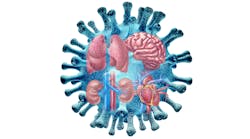After avoiding COVID-19 for two years, I stared at the double line on a rapid test. I had taken all the precautions to prevent this moment and thought I had evaded the virus.
I had begun my quarantine five days before testing positive, as my active symptoms of brain fog and chronic fatigue had already set in. Three days after the initial positive test, I began to experience debilitating chest pain. I couldn’t take a deep breath, and when I looked at my Fitbit, my resting heart rate was 185.
I drove myself to urgent care and described my symptoms to the nurse practitioner. She didn’t seem surprised. As she hooked me up to an EKG, she described how women in my age bracket were coming in almost weekly with these symptoms after testing positive for COVID-19.
My experience
To provide you with my full case study, I am 34 years old, fully vaccinated, and boosted; I take no prescription medication. I treat my anxiety by working out three to four days a week. I never experienced a fever or cough with COVID, simply extreme fatigue. After failing my EKG, I was advised to take an ambulance to the emergency room.
You might also be interested in ...
Parosmia after COVID-19: An elusive (and unpleasant) side effect
Dental aerosols and the pandemic: A necessary wake-up call
As a noncompliant patient, I decided to send a copy of the EKG to a cardiologist friend for review. I was advised to use an inhaler to allow my cardiac rhythm to balance. I spent the next 12 hours under the supervision of a doctor outside the hospital.
The following day, I returned to the hospital, struggling to breathe, although I wasn’t congested. The ER doctor was thorough and kind with his assessment, advising a chest x-ray and comprehensive blood work. He informed me that women ages 32–40 were at high risk for blood clotting and severe chronic depression, which became his primary concern.
The following five months of my life were extremely challenging. I struggled to get through an average clinical day or speaking event. I was relentless in my search for a cure for my symptoms; I spent three months unable to work out, which increased my anxiety. Every time I evaluated my heart rate, I was in the fat burning zone and continued to have abnormal EKGs. I completed six new-patient exams with primary care physicians throughout my state and only found relief after seeing a naturopath. The provider linked my long history of vaccinations with an mRNA response to my immune system. Two weeks after starting the supplements she recommended, I began to feel like myself.
What to know about long COVID
After extensive research, I found that my long COVID experience wasn’t ordinary. One in five COVID-19 cases will likely result in long COVID.1 Women are more likely to experience it; they account for an estimated 63% of cases.2 The average duration of long COVID symptoms is nine months for hospitalized patients and four months for those not hospitalized.2
Long COVID is also known as postacute sequelae of the COVID-19 virus. It is comprised of persistent or recurring symptoms that range from fever, headaches, cognitive impairments, cardiovascular difficulties, debilitating fatigue, blood clotting, depression, and disorders involving gastrointestinal and musculoskeletal systems.1 Similar symptoms have been reported after other viral infections, including the Epstein-Barr virus, mononucleosis, and dengue, as well as after nonviral infections such as Q fever, Lyme disease, and giardiasis.2
The risks of contracting long COVID are more significant in those who have not been vaccinated and boosted. But those who have been vaccinated and are immunocompromised are also affected by long COVID, having a 17% higher chance of experiencing it.
One study analyzed 2,667 vaccinated and hospitalized patients due to COVID-19 infection.3 The patients demonstrated a 2.5 times higher risk of death than people hospitalized with influenzas, and a 27% higher risk of long COVID in the first 30 days of diagnosis.3
Recent studies at the Washington University School of Medicine report that vaccinated people with mild breakthrough COVID-19 infections can experience debilitating lingering symptoms affecting the heart, brain, lungs, gut, and other parts of the body.3 An estimated 12% of vaccinated people with breakthrough cases will develop long COVID.3
Currently, there is no test to confirm long COVID or treat it in traditional Western medicine. Physicians often prescribe antidepressants to combat the brain fog many patients experience. Early research from Yale suggests N-acetylcysteine (NAC), an antioxidant that is being tested for TBI, could also help the cognitive deficits associated with long COVID.4
Editor's note: This article appeared in the April 2023 print edition of RDH magazine. Dental hygienists in North America are eligible for a complimentary print subscription. Sign up here.
References
- Robertson MM, Qasmieh SA, Kulkarni SG, et al. The epidemiology of long COVID in US adults. Clin Infect Dis. 2022;ciac61. doi:10.1093/cid/ciac961
- Crist C. 63% of long COVID patients are women, study says. WebMD. October 11, 2022. Accessed February 3, 2023. https://www.webmd.com/covid/news/20221011/63-percent-long-covid-patients-women-study
- Al-Aly Z, Bowe B, Xie Y. Long COVID after breakthrough SARS-CoV-2 infection. Nat Med. 2022;28(7):1461-1467. doi:10.1038/s41591-022-01840-0
- Backman I, MacMillan C. Yale researchers discover possible ‘brain fog’ treatment for long COVID. Yale Medicine. December 16, 2022. Accessed February 3, 2023. https://www.yalemedicine.org/news/long-covid-brain-fog-treatment







